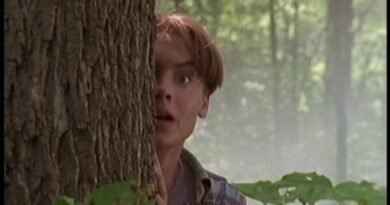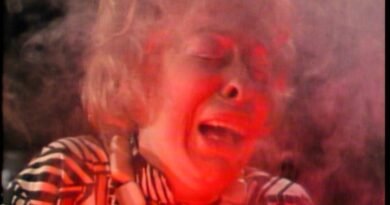Tales from the Darkside: “The Enormous Radio” (S3E22)

For its third season finale, Tales from the Darkside adapts John Cheever’s short story “The Enormous Radio”, and the result is a quietly unsettling, morality-laced domestic horror piece that leans more into Twilight Zone territory than the gruesome or gothic fare often associated with the series. It’s a sombre and subtle note to end the season on, but not without its charms—and chills.
Plot Summary
Jim and Irene Westcott are an ordinary upper-middle-class couple living in a high-rise apartment. They enjoy their music, their mild routines, and the illusion of a simple, moral life. That illusion is shattered when their old radio breaks and Jim replaces it with a large, mysterious-looking secondhand radio.
Soon after, Irene discovers that the radio is picking up something very strange—not music, not broadcasts, but conversations from other apartments in the building. At first, she’s intrigued. Then addicted. She becomes obsessed with listening to the dirty secrets and hidden lives of their neighbours, growing increasingly disturbed.
Her voyeurism begins to erode the couple’s relationship, as her moral compass twists and her sense of privacy and ethics unravels. But the final kicker comes when the radio reveals something even closer to home—turning its unwanted spotlight on Irene and Jim themselves.
What Works
Atmosphere of Paranoia
The episode effectively builds a creeping sense of paranoia and psychological discomfort. The radio, which never physically behaves like a supernatural object, becomes the conduit for an invasion of privacy that feels deeply modern, even decades after this was filmed.
Strong Source Material
John Cheever’s original story is a classic for a reason. It’s less about supernatural horror and more about the horrors of hypocrisy, repression, and voyeurism. That translates well here, and the script stays reasonably faithful.
Morality Play with a Sharp Edge
There’s a real sense of dread in watching Irene slowly lose her grip—not in a loud, theatrical way, but through subtle shifts in behaviour and growing moral self-righteousness. It’s the horror of the quiet breakdown, and it’s unnerving in its realism.
What Doesn’t Work
Pacing and Repetition
This episode is very slow. While that works for the psychological tone, it may try the patience of viewers expecting something more dynamic. There’s a lot of back-and-forth between Irene and Jim that starts to feel redundant.
Stagey and Static
It’s a very dialogue-heavy episode, with most of the action confined to a single apartment. That’s true to the story, but it limits the visual flair and gives the episode a stage-play feel that might turn off viewers looking for cinematic tension.
Limited Horror Appeal
While the concept is disturbing, it’s not particularly scary in a traditional horror sense. There’s no blood, no monster, and no big twist—just the slow unravelling of a couple’s ethical façade.
Themes: Hypocrisy, Voyeurism, and the Fragility of Morality
At its heart, “The Enormous Radio” is a moral tale about the dangers of self-deception. Irene is shocked and appalled by the behaviour of her neighbours, yet blind to her own growing ethical violations. The final irony—that her own life may not be as pristine as she believes—is a brutal, subtle twist that forces viewers to reflect inward.
It also comments on the intrusive nature of technology. Long before reality TV or internet surveillance, this story was probing the idea of what happens when we see too much of others, and reveal too much of ourselves.
Final Thoughts: Subtle, Smart, and Slightly Chilling
This is a quietly effective episode. It’s not flashy, and it likely won’t be a favourite for fans seeking classic horror frights. But for viewers who appreciate slow-burn psychological tension, it offers something rare in the anthology: introspection.
It’s a fitting end to Season 3—not with a bang, but with a hushed, creeping realisation that the monsters might not live next door. They might be sitting on the couch with you.
Who Would Enjoy This Episode?
- Fans of literary adaptations and psychological horror
- Viewers who enjoy themes of domestic tension and voyeurism
- Anyone who likes subtle, character-driven morality tales
Who Might Not Enjoy It?
- Viewers looking for jump scares or supernatural creatures
- Fans who prefer fast-paced or visually dynamic storytelling
- Those unfamiliar with or uninterested in Cheever’s style of quiet suburban dread
Final Verdict: A Whispered Descent into Ethical Chaos
“The Enormous Radio” closes Season 3 on a note of introspective horror. It’s a thoughtful adaptation that trades spectacle for soul-searching and invites viewers to wonder: if you could hear the truth, all of it, would you really want to?




